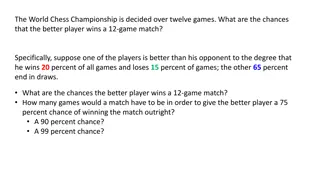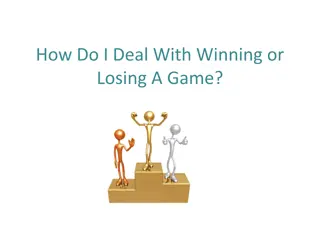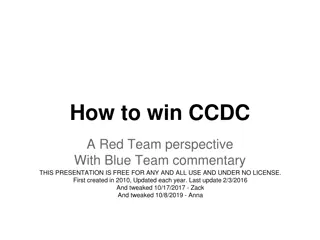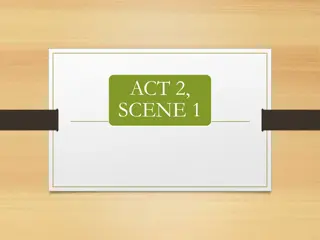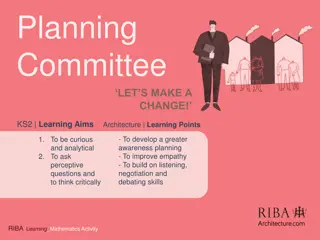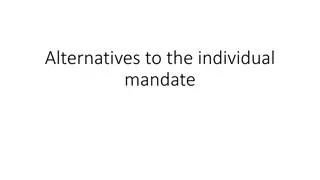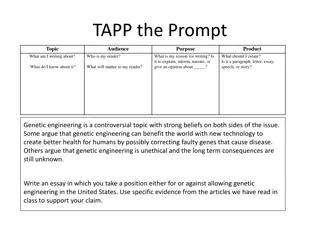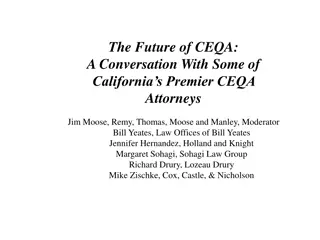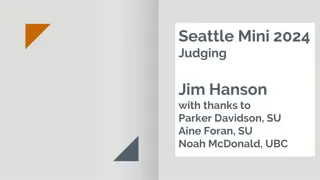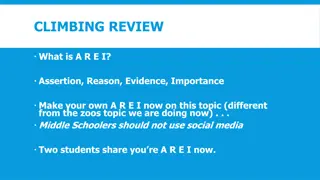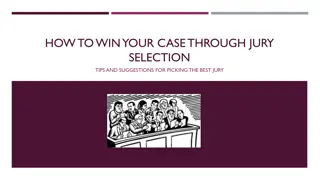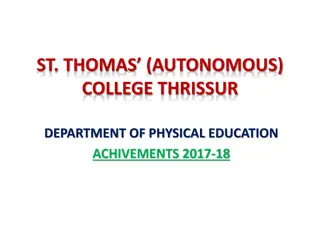Effective Debating Strategies for Winning
Engaging in public debates can be challenging, but by following key principles such as being knowledgeable about the topic, speaking truthfully, defending your actual views, knowing your time limit, addressing the audience, and maintaining a respectful tone towards opponents, you can improve your debating skills and increase your chances of winning. Focus on quality arguments rather than sleazy tactics to deserve the win.
Download Presentation

Please find below an Image/Link to download the presentation.
The content on the website is provided AS IS for your information and personal use only. It may not be sold, licensed, or shared on other websites without obtaining consent from the author. Download presentation by click this link. If you encounter any issues during the download, it is possible that the publisher has removed the file from their server.
E N D
Presentation Transcript
Cato Intern Debate Training Prof. Bryan Caplan Dep t of Economics and Mercatus Center George Mason University
Deserve to Win I frequently engage in public debates, including one on Let Anyone Take a Job Anywhere for Intelligence Squared. I ve also attended several earlier libertarian vs. conservative intern debates. Academic research on effective debating is thin, so I speak as a practitioner, not a research aggregator. Many sleazy debating techniques are probably effective: Appeals to emotion Changing the subject Ad hominem attacks Making persuasive arguments you know are wrong or overstated. I won t teach you these sleazy techniques. My real goal is to help you deserve to win debates. According to audience votes, I lost the IQ2 debate, but I stand by every word I said. However, there is probably a decent correlation between winning and deserving to win especially for smarter audiences.
Basics of Effective Debating: Content Principle #1: Become broadly knowledgeable about the subject under debate. Read lots of stuff you expect to disagree with. Never be satisfied with, Well, I disagree. Rule of thumb: When you know enough, you will be able to switch sides and still sound smart and reasonable. Principle #2: Speak literal truth. Go through your opening statement sentence by sentence. Is each sentence literally correct? If not, reword until the answer is yes for every sentence. Cut overblown rhetoric: 95% of debate uses of always, never, inevitably, certainly, necessarily, and so on make the sentence that contains them clearly false. Principle #3: Defend your actual views with your actual arguments. The easiest way to win a debate is to tell the audience what it wants to hear. But that s a Pyrrhic victory. If you refuse to defend the arguments that really convince you in a public debate, who will?
Basics of Effective Debating: Strategy Principle #4: Know your time limit. If you have 8 minutes for an opening statement, don t make your full argument. Pare your thesis down to your strongest two or three points. Don t talk faster to squeeze in extra material. Even smart audiences struggle to follow you at normal speaking speed. (Do as I say, not as I do!) Principle #5: Know who you re really addressing. While you often nominally speak to your debate opponent, he s a lost cause. You re really addressing the audience. Don t hunt for applause from your supporters, and don t expect instant converts. Mentally focus on convincing people who don t yet agree with you. If your view is extreme, just try to convince them it s not crazy. Principle #6: Talk to your opponent like he s your best friend. Novice debaters often demonize their opponents, making themselves look like dogmatic jerks. Switching to the opposite extreme is good strategy. Appeal to your opponents intelligence and conscience, even if you think these are lacking. Turn the other cheek! If your opponent treats you like dirt, reply nobly, not angrily. Undecided audience members will admire you for it. Friendship does not preclude gentle ridicule or offers to bet. Principle #7: If there s before-and-answer voting, make sure the audience clearly grasps the issue before the first vote. Initial votes are more about what side you re on, final votes more about the arguments. What I should have asked from IQ2.
Past Intern Debates: A Report Card Debating is a skill and like most skills, it heavily depends on practice. We shouldn t expect interns to be great from the get-go. Still, in past debates I ve seen lots of room for improvement. Both sides heavily violated my Basics of Effective Debating. Report card: Principle Libertarian Grade Conservative Grade Become broadly knowledgeable about the subject under debate. B- C Speak literal truth. C- C- Defend your actual views with your actual arguments. B C Know your time limit. C C Know who you re really addressing. D D Talk to your opponent like he s your best friend. F C- Make sure audience clearly grasps the issue beforethe first vote. C- C-
How to Improve Advice Principle Immediately start reading classic and recent works your opponents admire. Become broadly knowledgeable about the subject under debate. Purge overwrought verbiage from written statements, and try to suppress it from your unprepared remarks. A modest secure argument is better than a bold argument vulnerable to obvious counter- examples. Ask yourself: What are my actual views? and What are the arguments that actually convinced me to hold these views? If your views or arguments seem weak even to you, revise them! Speak literal truth. Defend your actual views with your actual arguments. Distill What are my actual views? and What are the arguments that actually convinced me to hold these views to fit your time budget. Then time yourself OUT LOUD until you can almost deliver your speech from memory without going over. Think about undecided members of the audience all day and all night. Picture them. Visualize having a good laugh with them. Know your time limit. Know who you re really addressing. Calm down. Swallow your pride. Ask your friends to stubbornly defend your least favorite arguments to your face until they no longer vex you. Psychologists call this Exposure Therapy, and it works! Talk to your opponent like he s your best friend. Think about how your audience is likely to misinterpret the question. If there s a serious concern, propose a pre-vote disclaimer and ask the moderator to read it. To be fair to your opponent, the disclaimer should precede both the pre-vote and the post-vote. Make sure audience clearly grasps the issue before the first vote.
Case Study: Debating Pacifism I ve publicly debated Profs. Jan Ting and Ilya Somin on pacifism. I m good friends with Ilya, but I didn t meet Ting until the day of the debate, so Ting was the greater challenge. So let s focus on Caplan vs. Ting. How on earth do you convert anyone to pacifism in 10 minutes? You don t. I just aimed to convince the audience my extreme view is not crazy. Distilling my actual arguments for my actual position down to 2 minutes (!), here is Pacifism in 4 Easy Steps. 1. In the modern world, there are no wars of "self-defense." War today inevitably means deliberately or at least recklessly killing many innocent civilians. This creates a strong moral presumption against war. 2. To overcome this presumption, you'd have to show that long-run benefits of a war are so wonderful than they clearly overshadow its grisly short-run costs. And you'd have to show that there isn't any cheaper, more humane way to obtain these benefits. 3. In practice, predicting the consequences of war is extremely difficult. Expert predictions are barely better than chance. "It's complicated" is not a good enough reason to deliberately or recklessly kill many innocent people. 4. There are much cheaper, more humane ways to attain the alleged humanitarian benefits of war. First and foremost: free immigration, so desperate people always have someplace to start a new life. How closely do I follow my own principles? You tell me.



